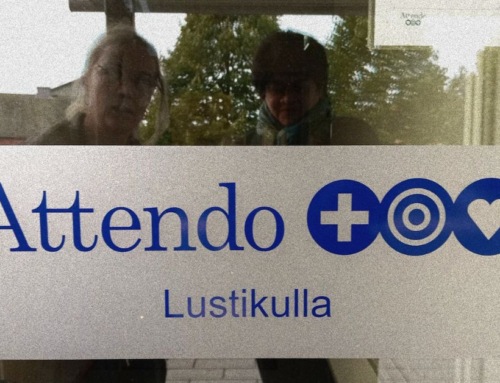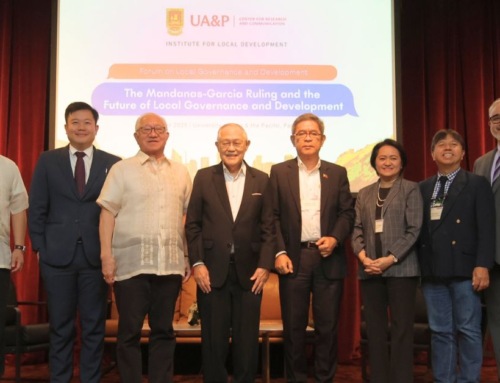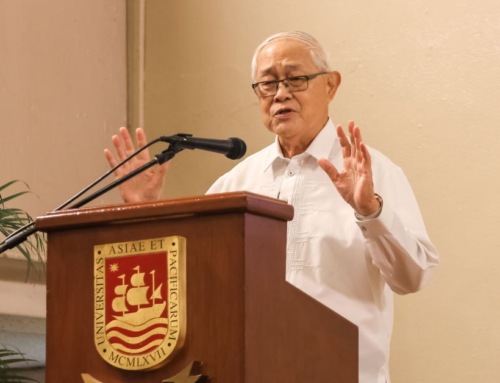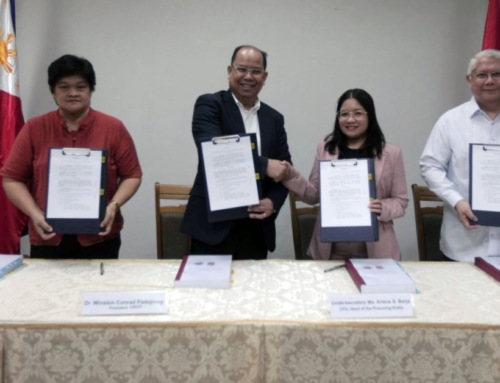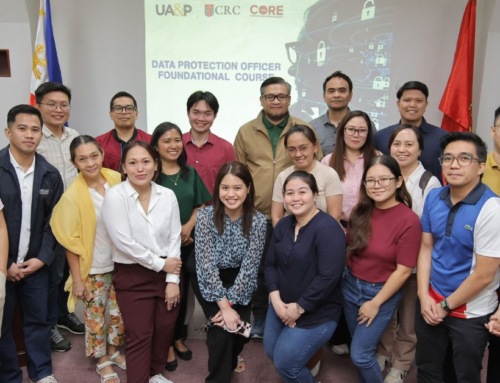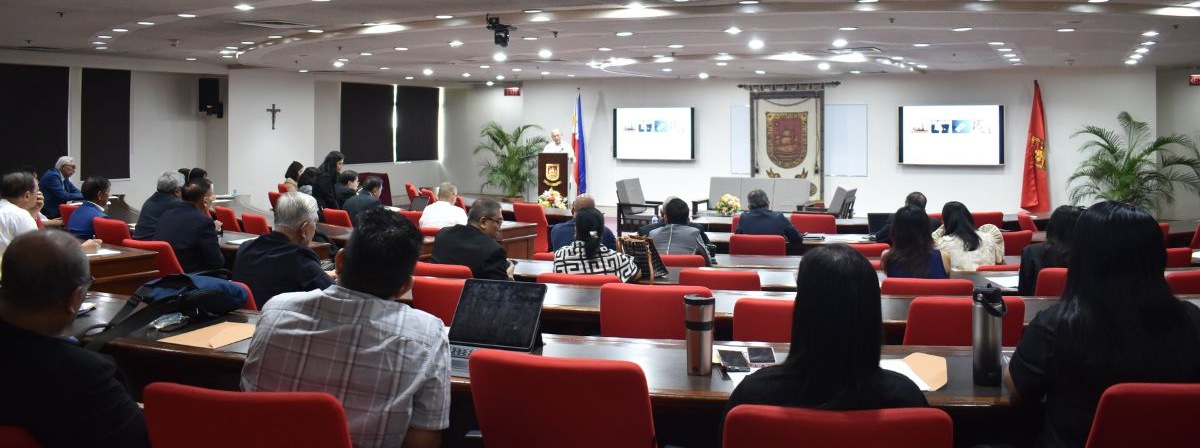 [UA&P, Pasig City, Philippines]- On April 11, 2024, the Center for Research and Communication of the University of Asia and the Pacific (CRC- UA&P), through the Professorial Chair for Social Economics, in partnership with the Employers Confederation of the Philippines (ECOP), and Philippine Chamber of Commerce and Industry (PCCI), and in collaboration with Alay Buhay Foundation, held the IGNITE AsiaPacific Conference entitled Bridging the TechVoc Skills Gap for Future-Ready Workforce at the PLDT Hall, University of Asia and the Pacific, Pearl Drive, Ortigas Center, Pasig City.
[UA&P, Pasig City, Philippines]- On April 11, 2024, the Center for Research and Communication of the University of Asia and the Pacific (CRC- UA&P), through the Professorial Chair for Social Economics, in partnership with the Employers Confederation of the Philippines (ECOP), and Philippine Chamber of Commerce and Industry (PCCI), and in collaboration with Alay Buhay Foundation, held the IGNITE AsiaPacific Conference entitled Bridging the TechVoc Skills Gap for Future-Ready Workforce at the PLDT Hall, University of Asia and the Pacific, Pearl Drive, Ortigas Center, Pasig City.
The conference brought together industry experts and educators to address skill shortages in the Asia-Pacific region, specifically focusing on Enterprise-Based Training (EBT) and Technical Vocational Education and Training (TVET), through discussions on business-led training initiatives in the context of the 4th /5th Industrial Revolution. There were around 100 stakeholders who attended the conference from various sectors and organizations: agribusiness, government, cooperatives, academe, exporters, chambers of commerce, and private sector.
The conference discussed the necessity of workplace learning for EBT and TVET learners, and advocating for government support and policy reforms to facilitate the successful implementation of EBT and TVET initiatives. The conference also showcased best practices and success stories in EBT and TVET implementation such as Dual Training, and facilitating dialogue and knowledge exchange among stakeholders to develop actionable strategies and recommendations for advancing EBT and TVET programs in the Philippines. There was also an extensive discussion focusing on enhancing collaboration between the private sector, TESDA, and other stakeholders to address the challenges and opportunities associated with TVET and EBT programs, including the need for industry-relevant curriculum, expanded access, and inclusive participation.
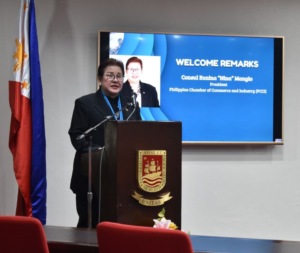
During the event, PCCI Chairman, Consul Eunina Mangio, gave the welcome remarks and emphasized the crucial need for a collective effort involving both the government and the private sector to foster the development and growth of the industry. She emphasized the shared goal of igniting the passion to bridge the technical vocational skills gap among graduates, thus, preparing them to be part of our future-ready workforce.
Plenary speaker Dr. Bernardo M. Villegas, Director for Research, CRC-UA&P, highlighted the critical importance of addressing the skills gap in ensuring the region’s economic competitiveness and sustainable development. Dr. Villegas’ presentation discussed the historical context of industrial revolutions’ transformative impact on workforce dynamics, the current economic landscape, challenges in industry engagement, and the evolving nature of human work in the age of smart machines. His insights underscored the urgency of bridging the skills gap and fostering a culture of lifelong learning. Through his visionary perspective, Dr. Villegas inspired the stakeholders to embrace technological advancements while nurturing human-centric skills, paving the way for a prosperous Asia-Pacific workforce.
The subsequent speakers contributed practical insights and recommendations to the panel moderated by Mr. Edicio Dela Torre, President, Philippine Rural Reconstruction Movement.
Panelist Dr. Alberto Fenix, President, PCCI Human Resources Development Foundation shared insights from the PCCI HRDF’s efforts to collaborate with local chambers and industry associations to implement dual training programs in priority sectors. He highlighted the successful partnerships with local governments and educational institutions to develop programs in sectors such as tourism, hospitality, information technology, agriculture, and construction.
Mr. Bonifacio Belen, Chief Operating Officer of KKC Services, Inc. shared that RA 11962 or Trabaho Para sa Bayan Act and the impending SB 363/HB 7400 hold tremendous promise in bridging skills gaps (industry sets standards), harmonizing policies (300 hours OJT to 18 months DTS; RMP of PRC), and driving innovation (IoT, algorithm ethics, Al prompt engineering) – a crucial leap forward in economic development and job creation. These legislative advancements are poised to institutionalize “MAGIC” -an acronym representing the transformative power of Making Academe, Government and Industry Collaborate. He shared that we all stand to benefit from these new laws, and as an employer, they could triple recruitment and confidently develop a truly proficient, exemplary, and specialized workforce.
Mr. Leopoldo Titular and Mr. Reynaldo Dela Cruz, Chairman and President of Pampamilyang Paaralang Agrikultura Foundation Inc. (PPAFI), respectively, emphasized the need for skills development, particularly in technical agriculture operations and agribusiness management. The need for transformative changes in the agricultural sector, especially concerning the dwindling interest of students in pursuing agricultural careers. The shift towards technology, globalization, and urbanization has affected the aspirations of both families and students, posing a challenge for the agriculture sector. Suggestions were made for public institutions to adopt private sector paradigms and for the government to facilitate collaboration between academia and industry to ensure the employability of graduates.

Plenary speaker Mr. Antonio L. Sayo, Chairman of the TVET Committee at PCCI and Vice President of ECOP, emphasized the pivotal role of the private sector in Technical Vocational Education and Training (TVET), his discussions revolved around collaborative efforts between the private sector and educational institutions to design industry-relevant curricula and provide practical training opportunities. Transitioning to a longer-term perspective, the focus shifted towards TESDA’s aspiration to become a department, with a significant emphasis on its connection to PCCI Chambers. The role of TESDA as a regulatory authority, transitioning away from its training function, was discussed, highlighting the need for industry experts’ involvement and adequate financial resources. Furthermore, discussions delved into specific competencies required, with insights into the demographic profiles of overseas Filipino workers (OFWs) possessing relevant skills. Emphasis was placed on bridging the gap between higher education institutions and industry needs, proposing courses like industrial engineering, and the importance of assessment and certification processes, facilitated by industry boards, was underscored, along with the significance of micro-credentialing for flexibility and accessibility in gaining qualifications.
Mr. Sayo emphasized that the efficacy of this endeavor takes root only if the private sector embraces TVET and adopts EBT as its own HRD Strategy. In essence, for TVET to truly flourish, it must find a welcoming home within the private sector. By adopting EBT as its own HRD strategy, businesses can not only meet their immediate talent needs but also contribute to the long-term socio-economic development of the community, It’s not merely about adopting a new approach to skills training; it’s about forging a symbiotic relationship between the industry and private sector to develop adaptable and future-ready skills workforce, increased productivity, and enhanced competitiveness in the ever-evolving global marketplace.
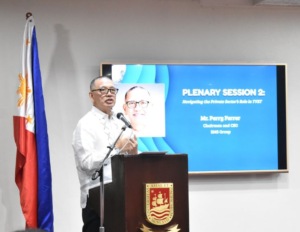
Mr. Perry Ferrer, Chairman and CEO of EMS Group, focused on the future of talent and skills. With a sizable labor pool of 48 million Filipinos, there’s concern about underemployment despite a declining unemployment rate. The private sector sees underemployment as a significant issue, expecting it to rise unless addressed collaboratively. There’s recognition of the need for digital skills in various industries, including agriculture, which holds potential with technology integration.
Emphasizing digital skills becomes crucial as jobs related to AI, VR, and cybersecurity grow rapidly. However, there’s a gap in basic ICT skills among Filipinos, hindering their employability. The private sector acknowledges its role in bridging this gap by defining in-demand skills, providing opportunities for on-the-job training, and supporting workers’ upskilling efforts.
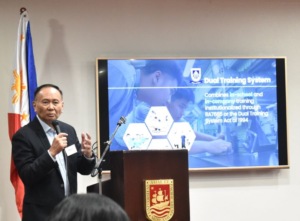 In the subsequent panel session moderated by Ms. Ma. Flordeliza C. Leong, Vice President of PhilExport, Mr. Rolando Rodriguez, Chairman DualTech Training Center, highlighted the significance of dual training systems, such as those implemented by Dual Tech, in providing a combination of classroom and hands-on training to prepare students for employment opportunities. The emphasis was placed on structured learning while ensuring graduates acquire both theoretical knowledge and practical skills, thus making them valuable assets to partner companies.
In the subsequent panel session moderated by Ms. Ma. Flordeliza C. Leong, Vice President of PhilExport, Mr. Rolando Rodriguez, Chairman DualTech Training Center, highlighted the significance of dual training systems, such as those implemented by Dual Tech, in providing a combination of classroom and hands-on training to prepare students for employment opportunities. The emphasis was placed on structured learning while ensuring graduates acquire both theoretical knowledge and practical skills, thus making them valuable assets to partner companies.
Dr. Jose Rene Gayo, Executive Director, Agro-Industrial Technology and Enterprise Center – AI TEC, discussed the challenges of funding and bureaucracy in implementing such programs, with recommendations for government support and streamlining of processes. Furthermore, Dr. Gayo also advocates for the regulatory focus of TESDA and collaboration with the private sector for sustained funding and effective program implementation.
Fr. Onofre “Jun” Inocencio, Jr., President of Unified TVET of the Philippines revolved around addressing the challenges and shortcomings in the Philippine education system, he stressed the importance of quality education and partnerships in empowering the workforce and achieving national development objectives. Fr. Inocencio called for a review of education policies to ensure alignment with societal needs and goals, aiming for tangible improvements in citizens’ lives.
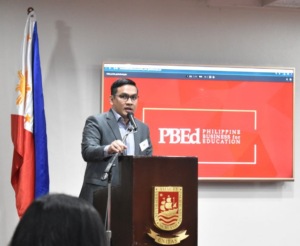 Mr. Hanibal Camua, Deputy Executive Director for Programs, Philippine Business for Education (PBED), discussed the state of Philippine workforce development. The numbers show that a significant portion of Filipinos belong to occupations composed mainly of basic skills. A recent report by CHR highlighted that even fresh graduates couldn’t meet the basic soft skills requirements for jobs. The Philippines ranks low in global talent competitiveness, making it difficult for individuals to find suitable employment, often leading to underemployment and low wages. The perennial problem of job skills mismatch persists. According to a study, job skills mismatch is one of the top concerns of employers, alongside local poaching and shortage of labor supply. This mismatch is exacerbated by the poor foundation of education and the lack of mechanisms to engage the private sector in education and skills development. There’s also a weak private sector voice in shaping education and skills development policies. To address these challenges, he emphasized the need to equip our youth with the necessary skills for the evolving world of work. This includes both hard and soft skills such as critical thinking, and technological literacy.
Mr. Hanibal Camua, Deputy Executive Director for Programs, Philippine Business for Education (PBED), discussed the state of Philippine workforce development. The numbers show that a significant portion of Filipinos belong to occupations composed mainly of basic skills. A recent report by CHR highlighted that even fresh graduates couldn’t meet the basic soft skills requirements for jobs. The Philippines ranks low in global talent competitiveness, making it difficult for individuals to find suitable employment, often leading to underemployment and low wages. The perennial problem of job skills mismatch persists. According to a study, job skills mismatch is one of the top concerns of employers, alongside local poaching and shortage of labor supply. This mismatch is exacerbated by the poor foundation of education and the lack of mechanisms to engage the private sector in education and skills development. There’s also a weak private sector voice in shaping education and skills development policies. To address these challenges, he emphasized the need to equip our youth with the necessary skills for the evolving world of work. This includes both hard and soft skills such as critical thinking, and technological literacy.
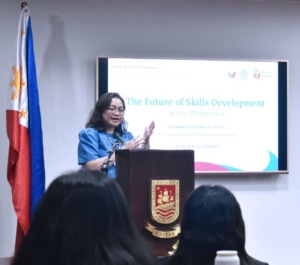 Ms. Charlyn Justimbaste, Executive Director of Planning at TESDA, shed light on the evolving landscape of skills development in the Philippines. With technological advancements reshaping job roles and industries, ED Justimbaste emphasized the need for continuous upskilling and reskilling to remain competitive in the labor market. Efforts are underway to bridge the gap between supply and demand in the labor market. TESDA, in collaboration with industry stakeholders, academia, and government agencies, is working to ensure that education and training programs meet the evolving needs of industries. This includes embedding technical education into all Senior High School tracks, implementing a Philippine credit transfer system, and developing higher-level technical qualifications. However, challenges persist, particularly in ensuring that education and training programs are demand-driven. Industry involvement, from policy formulation to training delivery, is crucial to ensuring the relevance and quality of these programs. TESDA is committed to strengthening industry partnerships, promoting competitive neutrality, and leveraging technology to enhance skills training. As TESDA transitions into its role as a regulator, manager, and promoter of technical education, it emphasizes the importance of collaboration with industry stakeholders to address the imbalance between supply and demand in the labor market. By focusing on demand-driven training programs and strengthening industry engagement, TESDA aims to better align education and training with the needs of industries, ultimately driving economic growth and societal development.
Ms. Charlyn Justimbaste, Executive Director of Planning at TESDA, shed light on the evolving landscape of skills development in the Philippines. With technological advancements reshaping job roles and industries, ED Justimbaste emphasized the need for continuous upskilling and reskilling to remain competitive in the labor market. Efforts are underway to bridge the gap between supply and demand in the labor market. TESDA, in collaboration with industry stakeholders, academia, and government agencies, is working to ensure that education and training programs meet the evolving needs of industries. This includes embedding technical education into all Senior High School tracks, implementing a Philippine credit transfer system, and developing higher-level technical qualifications. However, challenges persist, particularly in ensuring that education and training programs are demand-driven. Industry involvement, from policy formulation to training delivery, is crucial to ensuring the relevance and quality of these programs. TESDA is committed to strengthening industry partnerships, promoting competitive neutrality, and leveraging technology to enhance skills training. As TESDA transitions into its role as a regulator, manager, and promoter of technical education, it emphasizes the importance of collaboration with industry stakeholders to address the imbalance between supply and demand in the labor market. By focusing on demand-driven training programs and strengthening industry engagement, TESDA aims to better align education and training with the needs of industries, ultimately driving economic growth and societal development.
Sen. Win Gatchalian, Chairman of the Senate Committee on Basic Education, assured that he is committed to working as your ally in the Senate in bridging the skills gap to create a win-win situation for both the workforce and the industry partners. He highlighted that one of the measures we champion is the Batang Magaling Act, this proposed measure aims to equip our K-12 Senior High School graduates with the knowledge, training, and skills demanded in the labor market.
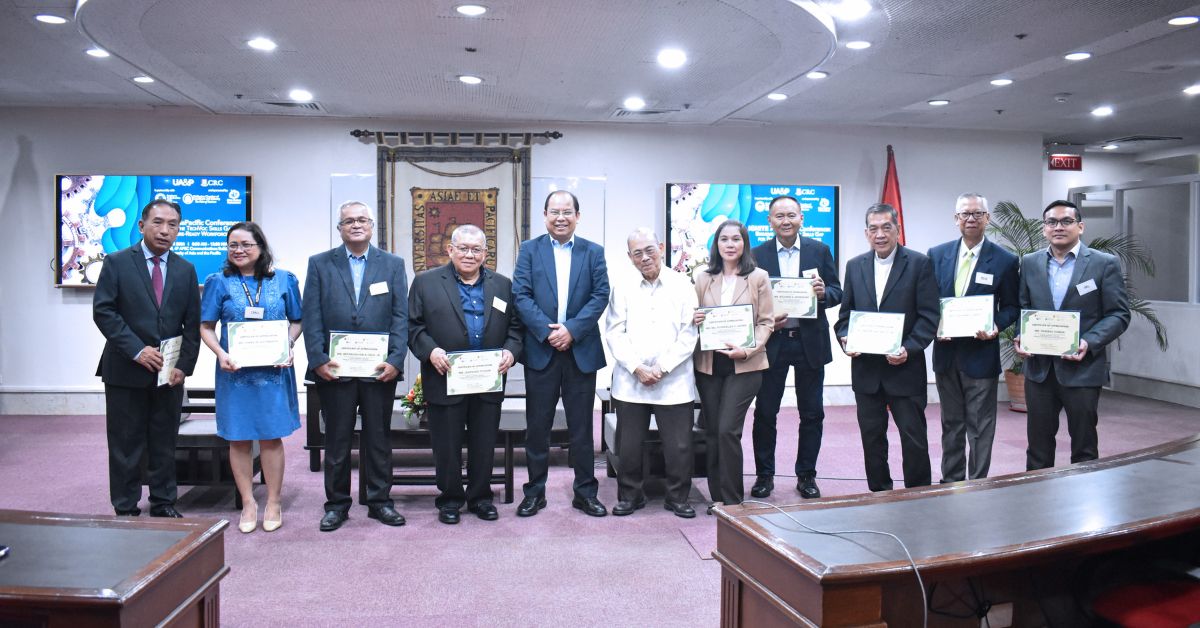
The event concluded with closing remarks from Dr. Winston Conrad Padojinog, President, UA&P, encapsulating the essence of the discussions and providing a fitting conclusion to the event. He underscored the importance of government, academia, and industry collaboration in bridging the skills gap for a thriving workforce amidst the changing landscape of work. By leveraging this partnership, we can accelerate job generation, alleviate poverty, address job skills mismatch, and promote the dignity of work. Moreover, he emphasized that vocational and technical degrees are just as crucial as traditional college degrees in equipping individuals with practical skills needed in today’s evolving market. Lastly, he encouraged the stakeholders to continue working together in investing in both vocational and academic education to ensure a prosperous and inclusive future for all.
———————————————————–———————————————————————————–
The Center for Research Communication (CRC) is the research and communication partner of the University of Asia and the Pacific (UA&P), uniquely poised to help you with business feasibility evaluation, demand and supply analysis, partnership development, project impact evaluation, value chain analysis, customized solutions for design thinking, data analytics and insights generation, and development of business strategies, and consultancy services for investors in Philippine market.
To find out more about CRC, send an email to [email protected], or message +639054280727, or follow us on LinkedIn. You can also find us on Facebook.

